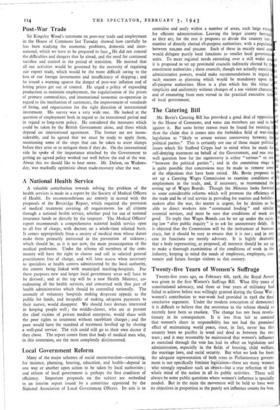The Catering Bill
Mr. Bevin's Catering Bill has provoked a good deal of oppositio in the House of Commons, and some zoo members are said to against it. But some better reason must be found for resisting it than the claim that it comes into the forbidden field of war-time u legislation as " likely to arouse serious controversy between the political parties." This is certainly not one of those major political issues which Sir Stafford Cripps had in mind when he made his self-denying statement on behalf of the Government, and one may well question how far the controversy is either " serious " or one " between the political parties " ; and in the committee stage it is quite possible that concessions may be made to remove some of the objections that have been raised. Mr. Bevin proposes to set up a Catering Wages Commission to examine conditions of employment in the trade, and, if necessary, to recommend the o setting up of Wages Boards. Though the Minister looks forward to some considerable reforms which will promote the efficiency of the trade and be of real service in providing for tourists and holiday- makers after the war, the matter is urgent, for he desires to be able to direct workers into• "communal feeding " and similar essential services, and must be sure that conditions of work are good. To reply that Wages Boards can be set up under the exist- ing law " after public inquiry " is to ask for unnecessary deliy. It is objected that the Commission will be the instrument of bureau-
of cracy, but it should be easy to ensure that it is not ; and in any d case its functions are merely advisory. It is highly desirable that a body representing, as proposed, all interests should be set up to make a thorough examination of the conditions of work in the industry, keeping in mind the needs of employees, employers, cus- tomers and future foreign visitors to this country.


























 Previous page
Previous page